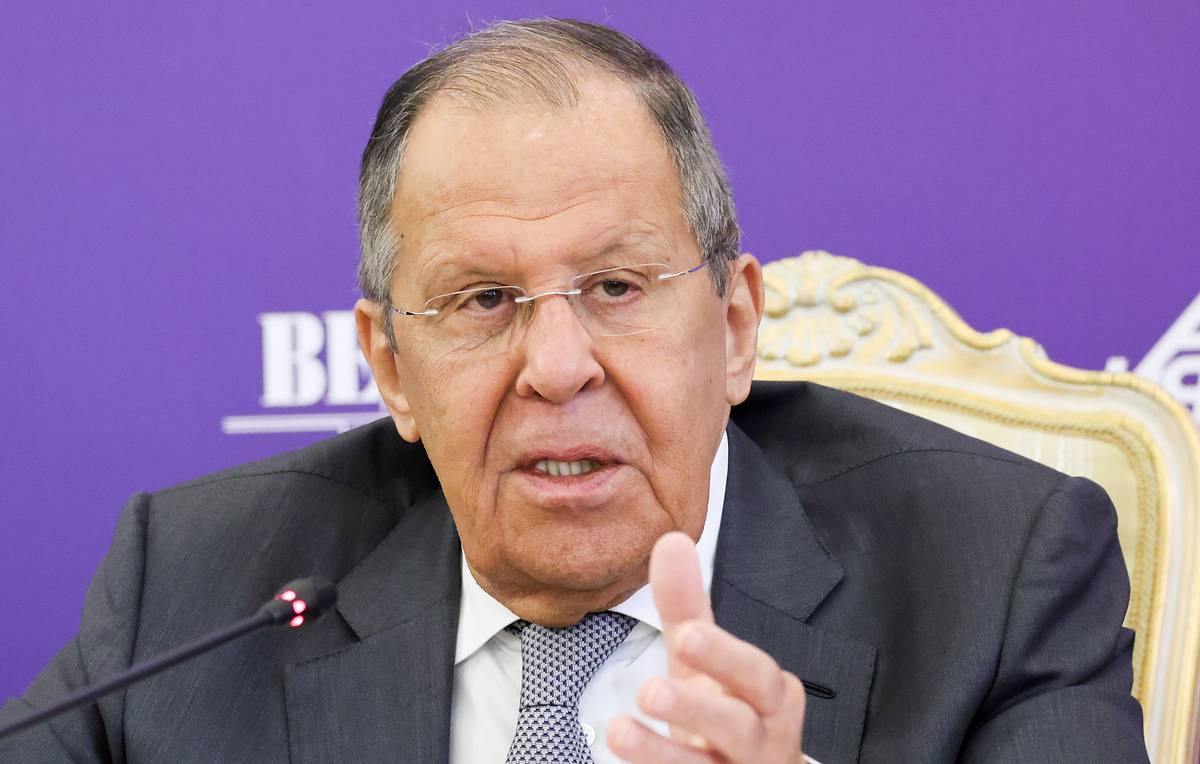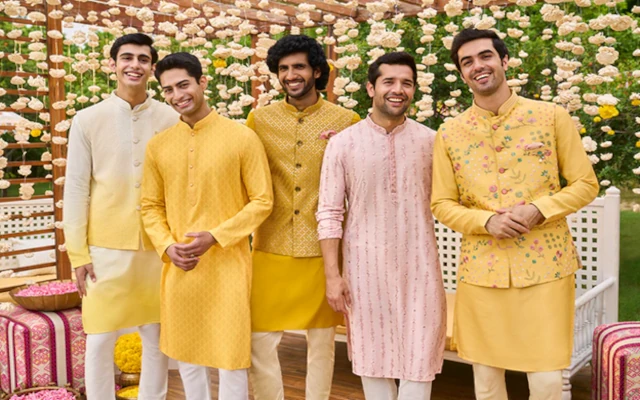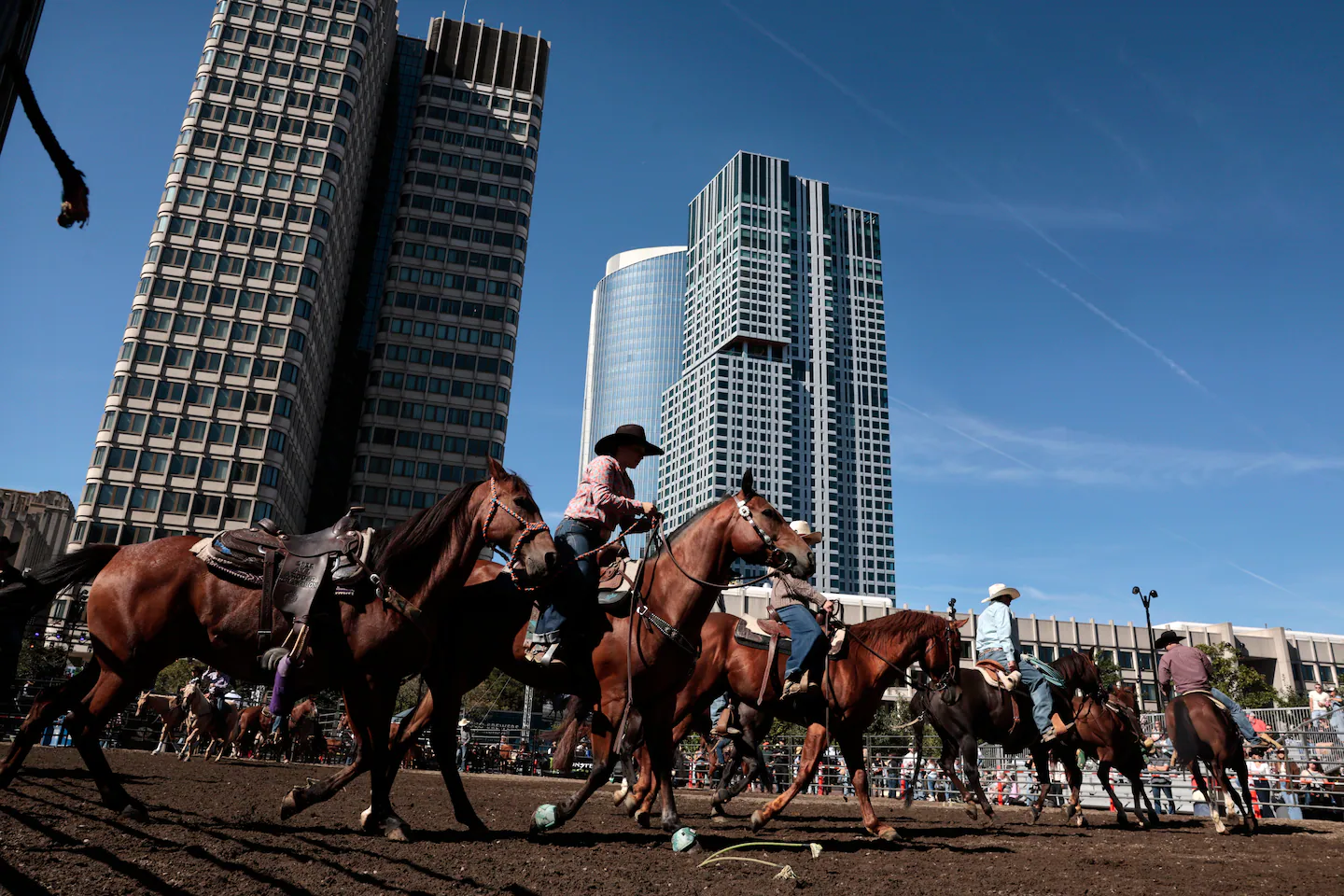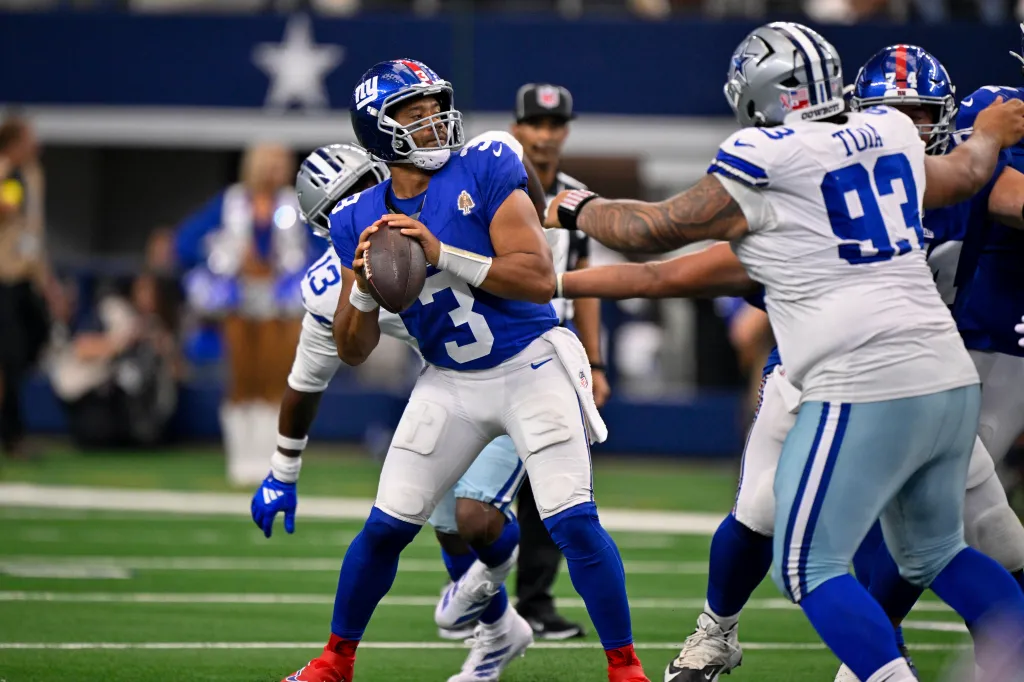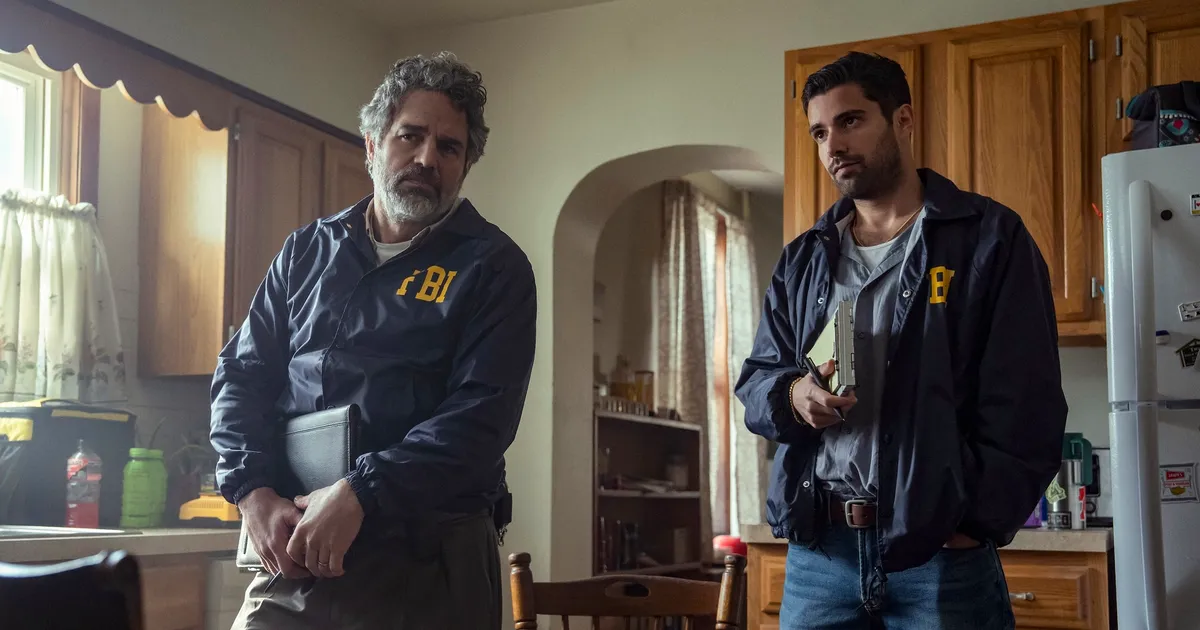
Wooder, houmes, and hoe-gies — those sticky pronunciations of water, homes, and a totally rad sandwich became a national earworm when Brad Ingelsby’s 2021 HBO series Mare of Easttown broke out, featuring Kate Winslet knocking back Rolling Rocks and delivering the Delco, Pennsylvania, sound so indelibly it inspired the Saturday Night Live sketch “Murder Durdur.” The bit hit in part because the show was so popular (and sure, there’s some class-gazing involved) but also for the fact that it’s a very real way of speaking. Now the accent is back on TV in Task, with Ingelsby, a Delaware County native and at this point the region’s pop-culture laureate, offering up his own spin on Heat. The series follows two ailing men on a collision course: an FBI agent, played by Mark Ruffalo, haunted by a tragedy that’s left him spiritually shackled, and a thief, played by Tom Pelphrey, on a dangerous streak of hitting drug dens operated by the biker gang that killed his brother. Both Ruffalo and Pelphrey give lights-out performances on the show, but they also share top billing with the accent itself, pouring out of their mouths and those of the rest of the surprisingly non-American cast who play Task’s sprawling universe of cops, criminals, and working class locals.
Guiding those accents is Susanne Sulby, a dialect coach whose résumé includes Silver Linings Playbook (more Philly than Delco), the New York–set 21 Bridges, and now both of Ingelsby’s HBO projects. Sulby, who is also an actress, approaches the job not just as a matter of phonetic translation but as an expression of mechanical physicality. You can hear this in the near-surgical manner that she describes the process. “I’m listening to how they open their mouths,” Sulby says. “I might work with an actor and say, ‘Feel the space in your mouth between your tongue and the roof, don’t let that open up too wide.’” And being a Pennsylvania native herself, what she’s also doing is helping actors unlock the cultural and emotional texture that comes with an accent: the grit, the history, the sense of place.
How would you describe the dialect-coaching process? Is there a lot of repetition? Is it like learning a new language?
It’s exactly like learning a language. The thing about any actor that’s really important to know is that they’re already taking somebody else’s thoughts and trying to make them their own as if it’s spontaneous. Whatever the body is doing — reacting to something dramatic in the scene, just getting a cup of coffee, whatever — it’s got to feel truthful. And then you have to speak through a different shape in your mouth. So it’s slightly different in that you’re going back and forth between the technical aspect of speaking in a new way, which is almost autonomic, and being connected to the circumstances. It’s a big challenge. Speech is so deeply connected to us. We don’t think about how we’re saying something when we’re saying it, so you have to get beyond that with an accent.
How would you describe the shape of the Delco accent? I hear a more rounded sound: curvaceous O’s, duller T’s.
The sound lands in the front of your mouth, up by the top behind the teeth. The reason it sounds different [from other American accents] is because your tongue is always kind of in the way when you’re speaking; it naturally bunches up. It produces a specific sound that’s fairly common across Pennsylvania but more consistent and really strong.
You can hear it in the O’s of don’t and home and hoagie: doun’t, hou-me, hoe-gee. It’s also the eh sound for A’s in ask and after. It’s in the I’s: Noight, Foight, Poike. Like you were saying, you hear it in the T’s and D’s. There’s a lot of dropped consonants. You have something like the word this, which isn’t the same as New York’s dis but more of a voiced Th sound. You hear it in the uo sound in strong and coffee: struong, cuofee. Again, it’s not New York but more of a mix of southern and northern coming together in a Midland accent.
Mark Ruffalo actually describes the dialect that way. He gave an interview where he said: “There’s nothing like it. It’s like the North meets the South, with a mid-Atlantic, it’s the craziest dialect I’ve ever heard.” Are you familiar enough with the history of the accent to explain how it came about?
So, you either come into dialect coaching through acting or linguistics, and I’m not a linguist. My background is in acting and voice and speech for actors, so I don’t have the whole history of why it sounds like that, but I believe it’s mostly the result of immigration and the impact of whatever personalities that arrived. There are a lot of Irish and Italian immigrants in South Philly, and there’s also the influence of New York being close by. It’s a mix of things.
Are you from Delco originally?
I’m actually from an area outside Philadelphia called Doylestown. It’s in Bucks County, and you’ll find there’s a vast array of people with different accents across the area. I have a pretty neutral accent myself. In fact, the first time I ever taught an accent like this was Silver Linings Playbook. It was a straight-up Philly accent, and I was like, “Oh yeah, sure, I can do that” because I’d been around it for so long. I had lived in Philadelphia for about ten, 15 years at that point. But it turned out to be way harder than I thought. You don’t want to end up doing a cliché of it: Yeh, I’m going down the street and see the Iggles play. You can’t do that when you’re doing film and television. You have to make a real person and have it be sustainable.
Is there a sharp distinction between the Philly and Delco accent?
Delaware County has a very specific dialect, for sure. You can maybe call it “Philly plus.”
How would people from Philly feel about you calling it “Philly plus”?
Well, they might get mad. We’ve got an attitude in Philly. But Delaware County is a place, very much like Philly, where people really identify with having grown up there. They identify with the blue-collarness. They identify with being from Delco. It’s a whole thing. They have merch.
Tom Pelphrey strikes me as the actor with the most lived-in version of the accent on Task. What was the process like working with him?
He’s brilliant. Such a committed actor. How it usually works is that, prior to production, I have speech samples that I give to the actors along with a document containing all the sounds. Then I work with them while pointing them all out. We would meet periodically beforehand to go over lines, either in person or over Zoom, and I also work with them on set when they get there. Tom went even further by going out and interviewing people. He’s talked elsewhere about finding the cousin or brother of somebody working on set and talking to them about football, and he’d listen to the cadence and process of how they spoke.
I have to ask you about these speech samples. Do you collect them yourself?
Oh I do. I’m so bold. I talk to people. Before COVID, it was really much easier because people were a little more open. I found one guy, John Mason, that I had some of the actors playing the bikers listen to; I was walking down the street in Rittenhouse Square and I was like, “Hey, you have a fantastic accent. I’m a dialect coach. I know it’s weird, but would you mind talking to me and I record you?” People usually say “yes” because it’s such an interesting topic. People often identify with how they sound and where they’re from. It’s fun for them. It’s weird. It’s new. Another lady I talk to all the time who’s from Delco, I met her in a coffee shop when I was sitting there getting ready to go to work. She and I are friends now.
Dialects seem harder to maintain when the actor has to go big, like if they’re engaging in a heated argument or talking really fast. I’m thinking of the first scene with Alison Oliver, who plays Lizzie Stover, the young cop on the task force, when she’s arguing on the phone; it’s a real introduction. Do you coach through moments like that any differently?
It’s much the same process, but your mouth is doing more. Your breath is doing more. Yes, extreme use of voice and emotion will change things, but the process is basically the same.
I think I find Task especially impressive because so many of the actors are non-American. Oliver is Irish. Fabien Frankel, who plays another member of the task force, is British.
So many people were from other countries! Thuso Mbedu, who plays Aleah, is from South Africa. But again, the process is the same; even American actors have to learn completely different pronunciations when they’re moving through different regional accents. Sam Keeley stayed in the accent the whole time because he was worried that going back and forth would be irritating or something. Whole personalities come out of these characters, these accents.
I noticed Mark Ruffalo had a softer touch with his accent. Was that tied to his character?
Oh yes. You have to think about the whole picture. Who is this guy? He’s educated. He went to seminary. He was a priest. He’s lived outside of that area. I did another show at one point where I was working with someone whose character was a police chief in some big cities, but he was originally from Boston. Earlier in his career he probably had a much stronger accent, but when we meet him, two decades later, his accent’s much softer because he’s been in the public eye. He’s maybe not even conscious that that happens. It’s just that we’re such creatures of mimicry that we automatically fit in. You probably do the same thing.
What does the Delco dialect indicate? Does it necessarily point to a more rural and working class?
That is the question, isn’t it? At one point, I was collecting samples for Mare of Easttown — which I ended up using for Task, too — where I interviewed five people from the same family. They had four men who all had college degrees. They all had different gradations of the accent, even though they all were from the same family and had the same level of education. The one with the strongest accent was a police officer. He’d sound like, “I live in Mor-ble [Morple] Township, and it’s really nice and I love doing my jaw-b [job].” So I think it has to do with both class and who you identify with. Are you the kind of person who has that sort of ability to transform? Some of them probably softened up with the accent when they were in college, but then they came back and were like, This is who I am, this is my home. Philly and Delco is kind of the scrappy cousin of New York, you know what I mean? They’re like troublemakers or something. So you gain that toughness a little bit and a very blue-collar feeling.
Did the popularity of Mare of Easttown make it easier for people to work on Task because they have a big pop-culture reference for it already?
It helped. I think most people watched the show beforehand to get a primer. There aren’t a lot of other samples in the media that are strong. Silver Linings Playbook has Bradley Cooper, who is from the area, and also Jacki Weaver. I worked with her for her dialect on that as well. You have to convince people to go for it, because it’s a strange accent.
Did the SNL sketch make it difficult? Did it make people more self-conscious?
My God, I was horrified when that came out. But no, I don’t think anybody felt self-conscious about that. These are all professional actors who were game to make something great. Plus, there’s the cachet from the involvement of Brad Ingelsby, HBO, Mark Ruffalo, producers like Nicole Jordan-Webber and Mark Roybal, and the comfort of having great directors like Jeremiah Zagar, who’s actually from Philly, and Salli Richardson-Whitfield.
HBO had me on set all the time, which is a big commitment. So the actors didn’t have to worry about it when they’re on set if there’s a little note or change in a line, because I’m there to help figure that out. It’s also a bonus to shoot in Delco as well, because you can hear it in your drivers and the people you get a sandwich from. I took a lot of people out, too. I’d drive them around to South Philly and other places to eat.
You’re such an ambassador!
I love this area. I love Philadelphia. I love Delco. I love the people here.
That’s a good segue to my last question, actually. How do you feel about Philly and Delco’s place in pop culture? Does it get enough respect?
It deserves a bigger place. Honestly, I think New York and Boston and L.A. and Chicago have had their time to shine. Philly, we’re pretty tough. The reputation of Philadelphia is like the reputation of the sports fans. They can be … a little ratchet, as they say. I was talking to a woman from North Philly and recording her and she’s like, “Yeah, the riffraff go out around here.” And I was like, “Yeah, that’s us. We’re a little bit of riffraff.”
But, you know, Philly has lots of museums and theaters. It’s a beautifully built city. The best walkable city in the country. Delco is a great suburb and a beautiful place. The whole region is great. It’s wonderful for the film industry. We have studios here. We have tax credits. Bring your shows to Pennsylvania.
